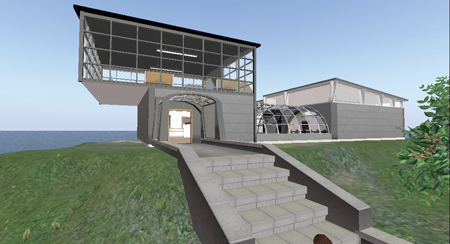On Hopkins Nursing Island, “all things are possible”
by Susan Middaugh
The Johns Hopkins Hospital and the School of Nursing are teaming up to create a parallel universe: “Hopkins Nursing Island,” an adventure in experiential learning that is right out of Hollywood, complete with avatars and interactive 3-D technology.
“To [new] nurses, it will be the next-best thing to being face-to-face with patients and almost as real as being at their bedside, ” said Leah Yoder, MSN, RN, Director of JHH’s SPRING program which teaches foundational skills, such as communication strategies, clinical reasoning, leadership, and professionalism to first-year nurses.

This new and entertaining way to educate nurses about evidence-based practice and interpersonal relationships is as far from the traditional lecture format as Maryland is from California. Participants will experience what it’s like to work in a four-bed clinic, interact with hospital patients and staff, explore the world of evidence-based practice, and conduct research—but do so in a 3-D virtual environment that engages their clinical imagination and sharpens their listening and observation abilities.
Yoder and Jodi Shaefer, PhD, RN, assistant professor at JHUSON, are creating Hopkins Nursing Island in Second Life (2L) as a pilot project with a development company in Canada. The four-bed model they are designing in 2L consists of elderly patients with congestive heart failure, a diagnosis that most nurses experience no matter where they work in the hospital. Avatars used by participants will walk, talk, and mimic behaviors nurses encounter daily on their units.
“All things are possible in Second Life,” says Yoder. The intent is to help learning nurses become more aware of their patients’ needs, safety issues, and interpersonal interactions by giving them opportunities to build a transferrable, layered knowledge base in a practice setting.
Yoder credits Debbie Dang, PhD, RN, Director of Nursing Practice, Education, and Research at JHH and Pamela Jeffries, PhD, RN, Associate Dean for Academic Affairs at JHUSON for their leadership in developing learner-centered educational activities, whether self-directed or in teams.
“Technology is a fact of life in the 21st century, especially in the healthcare field,” says Yoder, a self-named “Boomillennial,” a baby boomer who can speak the language of today’s young adults. “Millennials (men and women born between 1980 and 1995) have grown up with technology bombardment. We’re building on their experience and expectations. Second Life is another tool to make learning fun and engaging,” says Yoder.